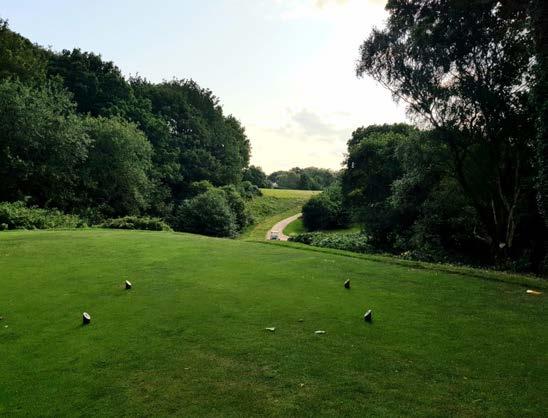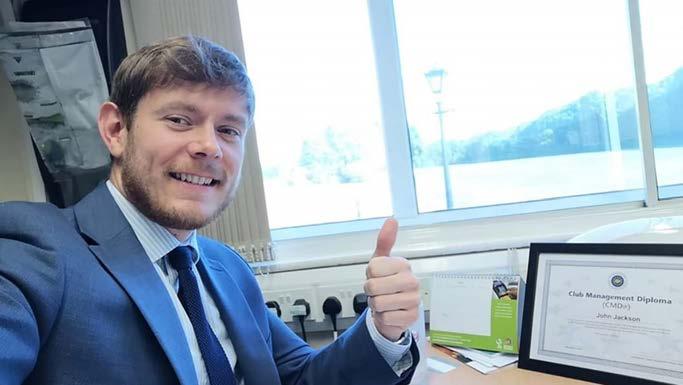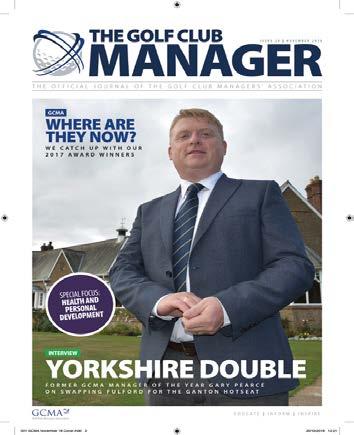
13 minute read
The club that won’t let Covid alter their plans
My success story... SCOTT CLARK
Membership boom or not, there are still plenty of clubs wary of the wrath coronavirus may bring. But, as Boyce Hill general manager Scott Clark reveals, the Essex club are refusing to let the unknown get in the way of their plans
Advertisement
A‘normal’ Monday once meant 40 golfers – now you need to put another digit in front.
A half-century have been signed up as members and all of them have paid a joining fee.
Scott Clark looks back over 16 weeks and can barely believe the numbers he is seeing. The daily average spinning round the course

at Boyce Hill is more than 170 players. Golf has enjoyed a golden summer. Membership is through the roof. Courses have been packed for months as the UK basks in the world’s biggest golf spike.
Yet the future looks so murky. Is the second wave now on the way, and another lockdown with it? Will clubs have to close their doors once more if coronavirus takes hold in winter?
In such uncertainty, it wouldn’t be
Boyce Hill
too much of a surprise to see clubs acting on the cautious side – to put on hold projects that might spend precious resources should things turn again for the worse.
That’s not how Boyce Hill see it.
“The key factor is looking after the bread and butter that is the core of the membership,” says Clark, who is the general manager at the Benfleet club. “We wouldn’t have been able to sustain anything without the membership and it is about making sure they get the best experience.
“It’s making sure we carry on our investment into the golf course. This year, we are committing to in excess of £35,000 to £40,000 of drainage.
“We’ve got a five-year rolling bunker programme. We are not going to let Covid halt our progress in that respect.”
Lockdown came with familiar concerns for Boyce Hill. “Did we have enough time? I don’t think anybody had enough time,” adds Clark.
But the ticking clock meant pressing decisions needed to be made quickly – especially with membership renewals fast on the horizon. The club made a choice that has split private institutions all over the UK, and has filled plenty of column inches since.
They gave their members a month for free. Plenty have warned of the potential folly, arguing that clubs that took this path are storing up a revenue shortfall.
Give it away now, and you have to pay for it next year, so the received wisdom goes. But Clark explains: “It was obviously a calculated risk as, by giving a month’s subscription free, we could compound our problem.
“It was a bold move but we felt it was definitely the right one to make. It was going to buy people some time to assess their finances and it was one less thing they had to worry about.
“If you grant it, you know where your shortfall is immediately. If we hadn’t and people turned round and said ‘we’re not going to renew until this is over’ you then create yourself a longer shortfall, which is unprecedented, and you don’t know exactly how much money you could be chasing or you could be losing. We know what we were in for and the decision was based on having a healthy enough reserve to make that calculated risk.”
He added: “It was a test to the loyalty of the membership and, as it actually happened, we had in excess of 120 members turn round and say, ‘The club supports me through everything, I am going to support the club and I’m going to pay my April subscription’.
“In essence, 25% of that shortfall was paid by the members anyway as, effectively, donating their April subscription to the club.”
Members then responded by
committing themselves for another 12 months too – the club coming through that tricky renewals question with a year that was better than average. Would that have been the case had Boyce Hill not made a magnanimous gesture?
“I’m not so sure,” admits Clark. “It might have just forced the hand (of some) and it was so early on in Covid (lockdown) that they would have withdrawn their membership until the muddy waters were clearer.
“We took that decision out of their hands.”
He adds: “We thought ‘we will make a statement of intent to our members that they have the club’s full support. For us, it paid off.”
Seven disaster forecasts later, written within the first week of lockdown, and Boyce Hill knew where their liabilities stood.
Clark cut expenses in half, 80 per cent of the club’s staff were furloughed as the doors stayed shut, and he then set what surely must



have looked like an ambitious target of breaking even throughout May, June and July.
“We were slightly ahead,” he says. “We actually made a little bit of money in June and that was really through solid cost control and the fact we had a good membership renewal. I looked at the positives (through lockdown). We knew there would be a boom. We knew the quicker we could get open that golf would be the number one thing on everybody’s mind. “
And so while the scenes of full courses, and bar tills ringing loudly in recent weeks, has been a source of relief for some – a chance to take stock and ponder what’s coming next – that’s far from what’s happening at Boyce Hill.
Clark and his team have decided it’s the moment to push on. Time to reinforce the club’s place in the minds of members and visitors as leisure activities that have traditionally stolen golf’s thunder in the past, but have been stymied by social distancing, start to return.
“Post-Covid has provided the boost for the golf industry that it has needed for decades,” he concludes.
“It has given us the boom we need to carry on the momentum that’s been created. We can’t rest on that. We need to ensure the experience

is better than it was before. We’ve got to make sure the product is better than it was before. That’s the only way we are going to ensure people see the value in what they are paying, rather than drift away into anything else. They’ve made a commitment to us – if you are paying £1,000 (joining fee) we have to make sure we are giving value for that. So they tell the next person we are the club to join.”
We want to hear all about the success stories at your club. Get in touch by emailing s.carroll@sportspub.co.uk
HEALTH AND SAFETY MANAGEMENT SOFTWARE PROTECT YOUR CLUB AT THE CLICK OF A MOUSE
Ground2Control is the secure and efficient way to proactively and cost effectively MANAGE RISK
Cloud based software can be accessed from anywhere on any device. Interactive and intuitive - See at a glance what procedures are in place, what actions need to be taken, when and by whom. Industry Specific Risk Assessments Library (with flexibility to edit or create your own). Extensive COSHH Library - COVID-19 Assessments for each

department. Expert advice as and when r equired including audits and site visits. Communicate & collaborate easily with staf f – instant access with set permission levels. Links to curr ent HSE and governing body guidance - updated as situations evolve. Documents stor e – link key external documents to your system.

ground2control.com | info@ground2control.com | 01845 445003

If you speak to any golf club manager across the world, one of the biggest challenges facing most golf clubs today is an ageing membership.
In 2018, England Golf conducted a survey of its affiliate member clubs. The survey looked at a number of key areas, one of which was membership.
According to the survey, the average golf club in England

has a total membership of 484 members. Of those, just over six per cent of the membership is made up of juniors aged five to 17.
If the game is to continue to grow and develop, something needs to change.
We need to come up with innovative new ways to increase the number of younger golfers playing this game. After all, young people are the future of golf.
Over the last couple of years,
A successful school taster day
developing junior golf has been a key focus of mine and is an area I have had great success in.
One of my greatest achievements to date with regards to junior golf came in 2018, while the club manager of Sale Golf Club.
Here, I successfully developed and implemented a junior development programme which saw over 1,000 school children across Greater Manchester try golf for free.
For many of the children, this was
Grange Park secretary/manager John Jackson reveals how a focus on junior golf proved hugely successful
their first ever time playing golf. Some of the children came from deprived areas of Manchester and never had the opportunity to play golf before.
This initiative was hugely successful. A proportion of the children went on to take part in further coaching sessions at after school clubs and some even went on to join the golf club as junior members.
So how did I do it? Here are the three main steps I took to successfully introduce golf to over 1,000 school children across Greater Manchester!
Step 1 - Set SMART Goals I started off by setting a SMART Goal. My main SMART goal was to introduce golf to over 500 school children across Greater Manchester by the end of August 2018. Having this goal in place gave me a clear focus. I knew what I was trying to achieve and by when.
Step 2 - Develop a Plan and create an offering too good to turn down! Now that I had my goal in place, I then developed a step-by-step plan detailing how I would achieve it.
I created a database of all the primary schools in Greater Manchester and made note of who the head teacher was at each school.
Once I had the names of the local schools, and knew who I had to contact, I created an offering which was just too good to turn down.
I decided to offer each primary school a free golf taster day. The day would be made up of several smaller taster sessions, aimed at different year groups.
The taster sessions would be fun and engaging and would give the children the chance to try golf. Best of all, they would be free!
However, if I was to be successful with this initiative, I knew I needed to get the buy in of the teachers. I spent time developing
John Jackson
a promotional pack, with a front cover which featured children playing golf, laughing, and having a good time.
I wanted to show the teachers that golf is a fun game and the children would love it.
It was also important that the pack was appealing to the teachers from an academic point of view. I detailed and promoted all the benefits golf had to offer the children such as improved fitness, improved co-ordination, maths development, honesty and team work.
Step 3 - Contact, contact, contact and don’t give up! Now that I had my offering and promotional pack ready, I was all set. I contacted over 80 Primary Schools across Greater Manchester, introducing who I was, what I was offering and explained just how beneficial the sessions would be

to the school children.
The uptake was slow to begin with. Some schools replied and a lot didn’t. It’s important that you persevere and follow up with telephone calls.
Six months later, I had visited 14 Primary Schools and delivered free taster sessions to over 1,000 school children!
For anyone working in sport looking to increase participation and membership, I hope you find this article helpful.
Your content partner


• VIDEO PRODUCTION • FLYOVERS • CORPORATE VIDEOS • COURSE PHOTOGRAPHY • MEMBER MAGAZINES • CONTENT WRITING
YOU CAN EXPECT TO DOUBLE YOUR CLICK-THROUGH RATES ON NEWSLETTERS BY OFFERING VIDEO CONTENT 57% OF CONSUMERS SAY THAT VIDEO BUILDS CONFIDENCE IN A PRODUCT

WEBSITES WITH VIDEO ARE 53 TIMES MORE LIKELY TO RANK NO 1 ON A GOOGLE SEARCH
From the ARCHIVES

We scour the GCMA magazine archives to find out what managers were saying in years gone by
Ten years ago Networking is today’s buzzword. We’re all doing it but, only 10 years ago, some regarded it as an “unnecessary management facet”. Not so Eddie Bullock who, in a lengthy piece in the magazine, argued against the backdrop of recession that there were ‘no excuses for not maximising every opportunity to strengthen the club’s operational and strategic direction in this ultra-competitive market’.
“A manager’s knowledge needs to include not only what is happening at the moment and what will - or may - happen in the future,” he wrote. “But it must also include the ability and resources to lead the club through such events and circumstances.
“The smartest and most successful managers don’t just know ‘the what’ of that, but they are also particularly knowledgeable of ‘the who’ - if they don’t know the answer or the solution, they have developed the ability to find it through the process of networking which they have cultivated down the years, and continue to develop”.
Networking, Bullock wrote, was one of the most important business tools - whether focusing on business operations, personal or strategic. As we’ve learned during the present coronavirus pandemic, it’s more vital than ever.
25 years ago A large feature focused on Marin Yates, the manager of Roehampton Club in London, and shows that tensions over dress

codes have merely travelled down through the decades.
Subscribing to an overall philosophy of balance and fairness, Yates admitted he was ‘constantly holding the ring between different activities’.
“For example, on the subject of dress code,” he said. “All members share the same bar and restaurant facilities, but the golfers want a collar and tie code and they resent the tennis players coming in in tennis clothes!”
An artfully placed screen of potted plants semi-divided the bar where, at one end, tennis players and casually dressed members would gather while, at the open terrace end, golfers and the like would drink.
50 years ago It might seem unthinkable in today’s point, click, and get whatever information you need as quickly as possible world, but it wasn’t long ago than even the biggest golf tournaments would find their reach somewhat sparser than might be expected. You’d be struggling, otherwise, to explain why Cecil Morton was given three pages to outline the story of the 1970 Open Championship to readers.
But he gave an in-depth description of each day, right down to the hole-by-hole scores. It was worth it, though, if for nothing else than the beautiful illustrations included by Jack Dunkley - the former Daily Mirror cartoonist who also drew for the Radio Times.






